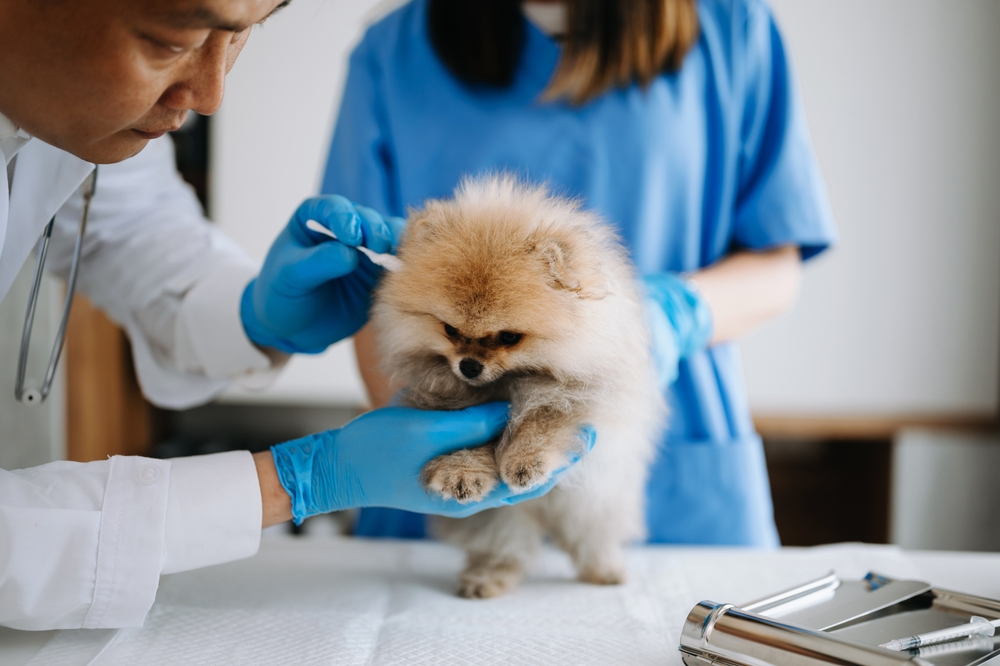All pets occasionally lick or scratch their skin, but incessant itch-relief behaviors can indicate an underlying skin problem. Constant licking, chewing, scratching, or rubbing at the skin indicate that your pet is itchy and they should be checked out by the Parker Center Animal Clinic team. Here is an overview of what you should do when your pet is itching and scratching, how our team diagnoses your itchy pet, and the itchy pet treatment process.
What should you do for your itchy pet?
If you notice that your pet is itchy, your first step is to contact our team and schedule an appointment. Although over-the-counter antihistamines help some pets, you should never give your pet any medication without first talking to a veterinarian. An Elizabethan collar (i.e., E-collar, or cone) can prevent pets from excessively licking, chewing, or overgrooming their skin, which can lead to secondary infections.
Why do pets itch?
Itching usually indicates an underlying skin condition. Rarely, the cause may be a skin tumor or autoimmune disease, but the most common itching causes include:
- Parasites — Fleas and skin mites (i.e., mange) are the most common parasites that cause itching in pets. Fleas generally cause only mild itchiness unless the pet is allergic to flea saliva, but mange mites may be intensely itchy and can lead to hair loss and skin redness.
- Insect bite allergy — The most common skin problem in pets is flea bite allergy, where only a single flea bite can cause intense itching, skin inflammation, and hair loss. Pets can also be allergic to mosquito, tick, or fly bites.
- Environmental allergies — Allergies to pollen, mold, grass, dander, dust mites, and more are extremely common in pets. Allergies cause skin inflammation, which leads to itching, secondary skin infections, hair loss, and skin darkening or thickening. Environmental allergies usually develop in young to middle-age pets and may worsen over time.
- Food allergy — Food allergies are uncommon in pets, but may develop at any age. Proteins in chicken, beef, egg, soy, wheat, fish, and other common pet food ingredients are the most common culprits.
- Bacterial or fungal infections — Skin infections plague most dogs or cats at some point in their life. Puppies, kittens, seniors, and adult pets with endocrine disorders are prone to skin infections, because of their inferior immune system. Allergies also commonly lead to secondary skin infections.
How do you diagnose an itchy pet?
To diagnose your pet’s itching, our team will first thoroughly examine your pet’s skin and perform several diagnostic tests to look for fleas, mites, and infections. Tests may include:
- Skin scraping — We will collect cells from hair follicles to look for mange mites.
- Skin cytology — We gather skin cells using various techniques, and examine them under the microscope with a special stain to identify bacteria, yeast, and inflammatory cells.
- Fungal culture — We collect hair that we place in special media to determine whether ringworm, a fungal infection, is present.
- Bacterial culture — We take a skin swab near raised or open lesions that the lab cultures to identify bacterial species and their susceptibility to antibiotics.
- Blood work — Blood work allows us to identify endocrine or other diseases that may contribute to skin problems.
- Allergy tests — We test pets with long-standing or difficult-to-treat allergies to determine their environmental allergens, so we can target their treatments. Allergy tests cannot identify food allergies in pets.
How do you treat itchy pets?

Itchy pet treatment depends on the underlying cause. Some pets have multiple itches at one time with different causes and need multiple, step-wise treatments to find relief. Some itch causes are curable (i.e., mange), while allergies are usually chronic and require ongoing management. Depending on your pet’s problem, itch treatments may include:
- Antihistamines — Antihistamines are effective for around one-third of allergic pets.
- Immune modulators — Steroids, targeted anti-itch drugs (e.g., Apoquel, Cytopoint), and immune suppressing drugs (e.g., cyclosporine) may reduce itch and inflammation.
- Antibiotics or antifungals — These drugs are used to treat skin infections that make allergic pets itchier.
- Medicated shampoo — Medicated baths allow soothing and antimicrobial ingredients to soak into skin, reducing the need for oral medications. Bathing one to three times per week is a mainstay treatment for itchy pets.
- Immunotherapy — Allergy “shots” help to gradually desensitize pets to their specific allergens.
Can you imagine how miserable you would be if you were constantly itching, with no relief in sight? Relieve your pet’s misery by scheduling a visit with the Parker Center Animal Clinic team. We will determine your pet’s underlying problem and prescribe treatments to quell their incessant itch.






